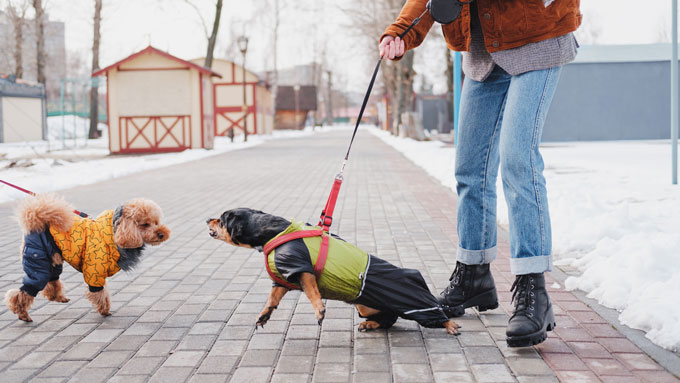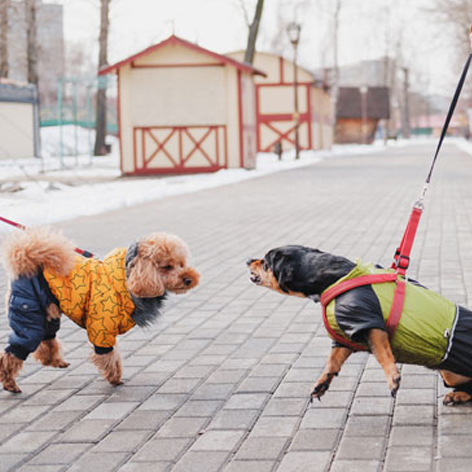Bark control tools

It’s a lovely day, you're in the park for a leisurely walk with your beloved dog, with the sun shining and a gentle breeze in the air. Everything seems perfect until, suddenly, your dog spots another furry friend and erupts into a chorus of relentless barking.
Passersby stare, fellow dog owners exchange awkward glances and you find yourself helplessly trying to control the situation. The peace you once associated with these outings has turned into a barking battleground.
Sound familiar? Well, you’re not the only one. Many dog owners also struggle with their furry pal’s excessive barking at other canines. In this guide, we'll unpack the secrets to ending your dog's barking frenzy and restoring the tranquillity of your walks. Learn how to stop dog barking at other dogs as we delve into its causes and effective solutions.
Why do dogs bark at other dogs?
Barking at other dogs can stem from various reasons. Understanding why your dog exhibits this behaviour before implementing corrective measures is crucial.
Here are some factors that can trigger your dog's barking at other dogs:
- Fear and anxiety — Dogs may bark at other dogs due to fear or anxiety. This is often accompanied by other signs of distress, such as cowering, trembling or trying to hide behind you.
- Territorial behaviour — Some dogs are naturally protective of their territory, including you, their owner. When they see another dog approaching, they may bark to assert their presence.
- Excitement — If your dog becomes overly stimulated or excited when encountering other dogs, they may express it through barking.
- Lack of socialisation — Insufficient exposure to other dogs during puppyhood can result in a lack of social skills. Barking can be a manifestation of their discomfort in such situations.
How to stop your dog from barking at other dogs
Below are some practical solutions to address and prevent your dog from barking at other dogs:
- Socialisation
Socialisation is pivotal to dog training, particularly when addressing excessive barking at other dogs. It involves systematically introducing your dog to various social scenarios and teaching them how to interact appropriately with other canines. During your dog's puppyhood, their socialisation experiences significantly shape their behaviour and responses to other dogs.
For effective socialisation, it's advisable to start in controlled environments. Obedience classes are an excellent choice, as they offer structured settings with professional guidance. These classes enable your dog to interact with other dogs under supervision, fostering positive social interactions and communication.
Organising playdates with dogs known for their calm and friendly demeanour can also be beneficial. This allows your dog to practise appropriate social behaviours and build their confidence in a safe and controlled environment.
Proper socialisation not only reduces your dog's anxiety and fear when encountering other dogs but also lays the foundation for more harmonious interactions. It's a vital step in ensuring your dog won’t start barking if they encounter their furry peers.
- Positive reinforcement
Positive reinforcement involves praising and rewarding your dog when they exhibit the desired behaviour, which, in this case, is staying calm around other dogs.
Here's how it works: When your dog is in the presence of other dogs and remains calm instead of barking or reacting aggressively, immediately offer verbal praise such as "good dog" or "well done". Alongside verbal praise, provide your dog with a tasty treat or a favourite toy as a reward for their calm behaviour. This combination of verbal praise and tangible rewards helps your dog associate calmness around other dogs with positive outcomes.
Consistency is key when it comes to positive reinforcement. Each time your dog behaves, reinforce this behaviour with praise and rewards. Over time, your dog will understand that staying calm around other dogs leads to enjoyable experiences, making them more likely to repeat this desirable behaviour. Plus, positive reinforcement not only reduces barking but also strengthens the bond between you and your furry friend.
- Basic obedience commands
Basic obedience commands are a valuable tool to stop your dog from barking at other dogs. These commands serve as essential building blocks for effective communication and control between you and your dog:
- Sit — Teaching your dog to sit on command provides a simple and effective way to manage their behaviour around other dogs. When your dog is in a situation where they might start barking at another dog, asking them to “sit” redirects their attention and keeps them composed.
- Stay — The “stay” command comes in handy when you want your dog to remain in one place, even when other dogs are nearby. It allows you to control their movements and prevent them from barking at and rushing towards other dogs.
- Leave it — “Leave it” is a command that can be a lifesaver. It teaches your dog to ignore distractions, including other dogs. When they are about to bark or react negatively, a firm “leave it” command can make them focus on you instead.
These basic commands form the foundation of your dog's obedience and control. Regular training is vital to ensure your dog consistently and reliably follows these commands, particularly when other dogs are around.
It takes time and patience, but as you work with your dog, they will come to associate these commands with positive experiences. This will help decrease their barking tendencies, leading to more harmonious interactions with other dogs.
- Bark control tools
In your quest to teach your dog not to bark excessively at other dogs, bark control tools can be invaluable aids. These are designed to provide effective and humane ways of curbing excessive barking tendencies in your furry companion.
At DogMaster Trainers, we stock a variety of bark control products, including bark control collars, static correction bark collars, ultrasonic bark deterrents, vibrate collars and bark control collar accessories. Explore our range today to find the perfect solution for your pet!
DogMaster Trainers — your partner in teaching your dog to stop barking at other dogs
If your dog's barking persists or is accompanied by aggressive behaviour, consider consulting the professionals at DogMaster Trainers. Our experienced team can assess your dog's specific needs and provide personalised guidance. Ready to address your dog's barking issues? Contact us today.

